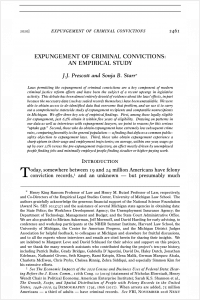Expungement of Criminal Convictions: An Empirical Study
J.J. Prescott & Sonja Star, 133 Harvard Law Review 8
According to the article's authors, laws permitting the expungement of criminal convictions are a key component of modern criminal justice reform efforts and have been the subject of a recent upsurge in legislative activity. The authors further contend that this debate has been almost entirely devoid of evidence about the laws’ effects, in part because the necessary data (such as sealed records themselves) have been unavailable. In writing this article, the authors were able to obtain access to de-identified data that overcome that problem, and used it to carry out a comprehensive statewide study of expungement recipients and comparable nonrecipients in Michigan.
In the study, the authors offer three key sets of empirical findings:
- First, among those legally eligible for expungement, just 6.5% obtain it within five years of eligibility. Drawing on patterns in the study's data as well as interviews with expungement lawyers, the authors point to reasons for this serious “uptake gap.”
- Second, those who do obtain expungement have extremely low subsequent crime rates, comparing favorably to the general population — a finding that defuses a common public-safety objection to expungement laws.
- Third, those who obtain expungement experience a sharp upturn in their wage and employment trajectories; on average, within one year, wages go up by over 22% versus the pre-expungement trajectory, an effect mostly driven by unemployed people finding jobs and minimally employed people finding steadier or higher-paying work.
Based on the results of the study, the authors contend that their findings strongly support increasing the availability of expungement, and particularly efforts to make expungements automatic, or at least procedurally easy to obtain. The authors found that those whose records are expunged experience large gains in employment rates and wages, and while some of these gains may have their source in other factors such as underlying motivation, expungements very likely cause a substantial portion of these improvements. The expungement effects revealed in the study, the authors contend, imply that record clearing compares favorably as a strategy to other policy interventions that seek to improve employment outcomes.
